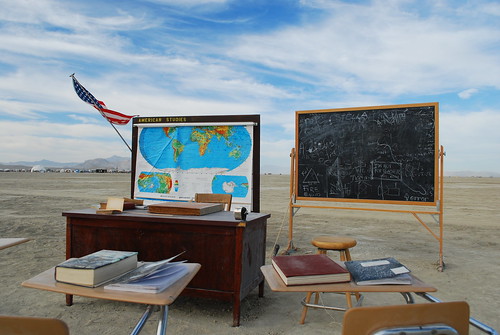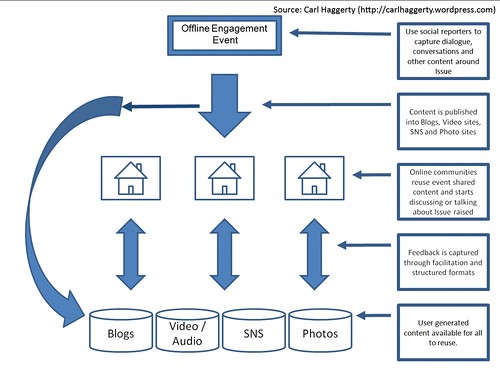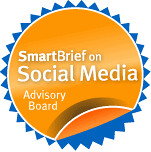
Photo by Justin Benttinen
This past week was a busy one for leading workshops. I was in Washington, DC where I did a session on social media strategy for a convening of Packard Grantees.
My participation included:
- An interactive presentation on best practices for using social media for external communications
- Peer discussion on use of online tools for collaboration for bounded networks, exploring some of the concepts in Digital Habits (each participant got a copy)
- Half-Day Session: Social Media Strategy Game which included small group work for participants to come up with a strategy for both external communications and an internal learning network to share best practices.
I also lead a workshop on social media strategy for communications professionals who work with networks, nonprofits, and foundations. My reflections are here.
My reflections have mostly that has been around the subject matter of how nonprofits and foundations are thinking about and using social media. But, I'm also interested in improving my skills as a trainer - especially facilitating social learning or learning in public.
I've heard that phrase "learning in public" a few times this week and I'm also seeing how social media accelerates this - especially at conferences and other places where we have typically gone for our professional development and opportunities for adult learning.
What is Social Learning or Learning in Public?
Learning in private is what most of us did in school. You wrote your essay, studied your spelling words, took tests (without looking at anyone else's answers). Learning was an individual, often solitary activity. for many of us, that learning style carried over to our work culture where we are rewarded for our expertise and to keep private what we don't know.
Many people call me an expert in social media - and when you've been given that label there is a certain pressure about having to know everything. It may also happen when you have the word "scholar" in your title too. But, I think that social media is unleashing a new opportunity for social learning or learning in public for adults. (Thanks to Jeris to sending me the link)
And that can be fun too! Certainly less exhausting than having to know everything.
Creating an environment for learning in public means that it is okay to say “I don’t know” about an issue or problem and to ask others what they think. When professionals acknowledge not knowing and reach out to a colleague, it not only opens us to learning, but it signals to others that they can acknowledge that there are things they don’t know - it begins to change the culture - whether that be the training room or within an organization or at a conference. I find myself doing this on Twitter more and more. Retweeting is boring. I want to know what you think.
We are also learning in public when we engage in in-depth conversation whether it is offline or online, for example in the comments of a blog post or asking questions on Twitter. Conversation is a “learning in public” tool – maybe one of the best. Social media is a conversation engine.
Using social media and social networks successfully requires a culture shift away from learning in private to learning public or what Nancy White has called "Over the Shoulder Learning." How do you do this? How do create an environment where it is okay to learn in public? This environment can be a training workshop or it can be in an organization. The answer comes from Eugene Eric Kim in a recent presentation he did about networks, "Be the Change You Want To See" - it's about modeling.
Putting It Into Practice As a Facilitator
As social media becomes more and more present at conferences as way to capture, document and share what is happening at conferences, presenters will need to become more comfortable with public learning and integrate a social strategy. Jeremiah Owyang has a terrific post with some advice on how to do this. He suggests:
- Prepare More Than Ever
- Know Your Audience’s Social Technology Adoption.
- Monitor the Backchannel While Speaking
- Develop Backup Resources to Monitor
- Interact with the Audience
- Practice Two-Fisted Speaking
I've thought about this pretty deeply for the past few years - how can you make your presentation as responsive and interactive with the audience. During the panel I organized at SXSW last year, I incorporated audience interaction without having to do the two-fisted speaking which is distracting for me. Here's what I did:
- Created a unique #hashtag for the session and encouraged the audience to use it
- Designated back channel moderators in the room to answer questions, throw links in the discussion while it was happening. Also, I introduced the back channel moderators to the audience at the beginning and at appropriate times ask them to verbalize what they were reading in the Twitter stream and we addressed.
For the preparation piece, I spend more time researching the audience than anything else. If follow their social media ant trails and screen capture examples that show up in my presentations. I even ask them to twitter their answers or provide more insights for the audience via the back channel. I tell the audience up front that they might be part of the presentation.

Illustration by Carl Haggerty via David Wilcox, Social Reporter
See larger illustration here
Offline/Online Interaction
Many conferences have an intentional, overall social strategy to raise the profile of the conference or document the learning. Next week the Communications Network Conference will unleash a Gorilla Capture Team who live twitter, use FLIP cameras, digital cameras, and blogs to cover the conference. They've set up some fabulous training materials and guidelines for the capture team.
- Overview of Launch Meeting
- Deployment Packet
- Twitter Training Notes and Audio File
- Flip Cam Training Training Video, and Audio File
- Agenda with Twitter IDs
I love the way they've made fun for the capture team to document the conference and their evaluation questionnaire. What I wonder about is the next step of engaging people or sharing the learning with people who are not in the room?
I know as part of my social strategy for presenting, I'm live tweeting to people who aren't in the room but could add to the conversation.
David Wilcox shared the above diagram from Carl Haggerty that illustrates this point.
- Are you learning public?
- Is your organization engaging in social learning?
- Why or why not?





Yes! and... to make one more connection on social learning--Andy Goodman, nonprofit communications guru, former screenwriter, and author of Why Bad Presentations Happen to Good Causes (free download), makes the point that presenters here to date have tended to avoid interaction between participants (a survey of nonprofit types he did for the book found fewer than 10% of presenters ask audience members to interact with each other in the course of a presentation).
It can be hard to make interaction -- one component, I guess, of social learning -- work, especially given that it's not a native learning style for most of us. But (like you also note) it sure is a heck of a lot more fun for everyone involved!
Posted by: gordon | October 13, 2009 at 08:24 PM
I could have done with reading this post, and the last two or three, tackling social media about 1 month ago! Thanks :)
Posted by: Abby | October 14, 2009 at 04:35 AM
Hi Beth,
I work with Carie Lewis at the Humane Society of the U.S. and I'm new to the social media sphere. I've been following your blog, and several of your recent posts remind me of the best workshop I've ever taken, which was called Dialogue Education. This approach focuses on learning through conversation and teamwork, and it emphasizes that adults are decision-makers who are active subjects in their own learning. Central to this approach is the importance of creating a safe environment, which gets back to public learning and the idea that people need to feel safe before they'll risk failure in the process of learning something new. The website www.globalearning.com is a great resource, as well as the book Learning to Listen, Learning to Teach by Jane Vella. Thanks for providing such an engaging discussion!
Posted by: Hillary | October 14, 2009 at 08:41 AM
Another great blog, Beth. It's good to distinguish "social learning" from "societal learning"...when we are all "social learners" maybe we'll have "societal learning" happening...when societies can make large shifts without bloodshed, such as ending apartheid in South Africa...and not take so long to do it! I distinguish between the two in http://www.greenleaf-publishing.com/productdetail.kmod?productid=70
Posted by: Steve Waddell | October 14, 2009 at 09:07 AM
I appreciate the time you have spent thinking through this learning issue. Too many folks sugget it's just x or y; clearly, understanding the learning process in the "new" world is not simple. Thank goodness we have "Beths" in person to guide us.
Posted by: Andre | October 14, 2009 at 10:01 AM
Beth,
This is a nice piece of work. I read this as a core Action Learning piece updated as Social Learning. It is a nice blend of Revans original work on AL and how essential it still is today but now juiced by technology. People would advance their skill set by capturing the history of of AL and using it's frameworks as a foundation for building today's Social Learning.
Thanks for the advancement
Rick
Posted by: Rick Torseth | October 14, 2009 at 11:22 AM
Steve: Loving that term "societal learning" and thanks for the resources
Posted by: Beth | October 15, 2009 at 05:56 PM